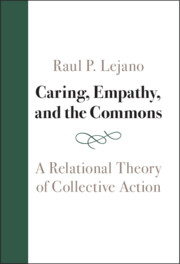Book contents
- Caring, Empathy, and the Commons
- Caring, Empathy, and the Commons
- Copyright page
- Contents
- Figures
- Tables
- Preface and Acknowledgments
- 1 Introduction
- 2 Constructing a Relational Theory of Collective Action
- 3 Further Justifications of the Relational Theory
- 4 Connectedness and Pro-Social/Pro-Environmental Behavior
- 5 Illustrations
- 6 Institutional Considerations
- 7 Prospects of Relationality
- References
- Index
2 - Constructing a Relational Theory of Collective Action
Published online by Cambridge University Press: 17 August 2023
- Caring, Empathy, and the Commons
- Caring, Empathy, and the Commons
- Copyright page
- Contents
- Figures
- Tables
- Preface and Acknowledgments
- 1 Introduction
- 2 Constructing a Relational Theory of Collective Action
- 3 Further Justifications of the Relational Theory
- 4 Connectedness and Pro-Social/Pro-Environmental Behavior
- 5 Illustrations
- 6 Institutional Considerations
- 7 Prospects of Relationality
- References
- Index
Summary
A formal, decision-theoretic model of relationality is presented. Some elementary (game-theoretic) examples are provided that show how relationality can transform a social network into a collaborative community of other-regarding individuals. Early results from experimental economic games are provided that illustrate the models explanatory power. The model is compared, side-by-side, with Ostroms conceptualization of commons management as a repeated game with social sanctions.
- Type
- Chapter
- Information
- Caring, Empathy, and the CommonsA Relational Theory of Collective Action, pp. 22 - 38Publisher: Cambridge University PressPrint publication year: 2023

